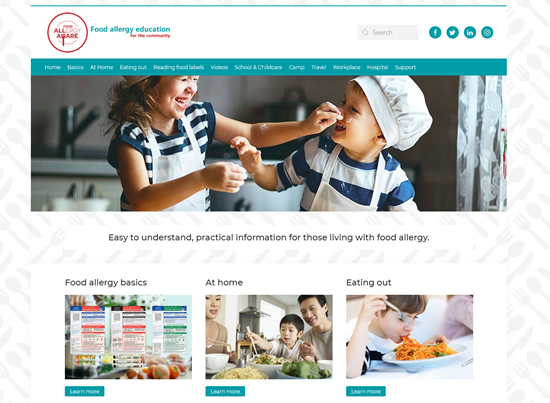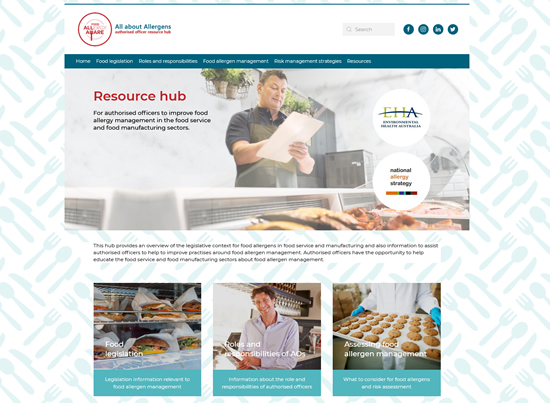Newsletter February 2022
In December 2021, we held project planning meetings with the National Allergy Strategy staff, co-chairs and project co-leads, which has given the National Allergy Strategy a good start to 2022.
Nip allergies in the Bub
NEW infant feeding video series
We are excited to announce a new series of short videos to help parents feed their babies the common allergy causing foods. There are four videos (one for each stage of feeding development) that demonstrate how to prepare some of the recipes from the Nip allergies in the Bub recipe booklet that can be downloaded from the website. We have also updated the recipe booklet to include photos of the recipes that are featured in the videos.
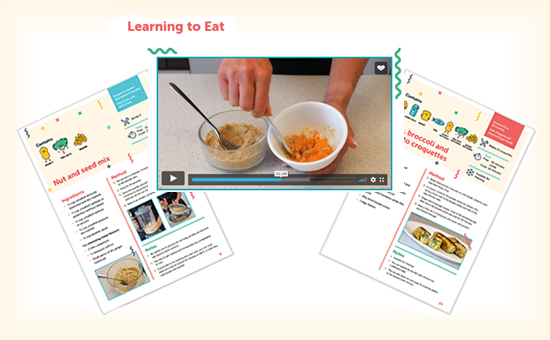
Website review
The Nip allergies in the Bub website has undergone a major content review. This website provides practical advice about how to introduce the common allergy causing foods to babies and how to optimise eczema management, to help prevent food allergy. ReadSpeaker has also been added to the website to allow for content to be read aloud and/or translated into more than 20 languages.
Coming soon
We have created some resources specifically for social media to provide parents with information about how to select and apply moisturisers. We are also developing some visual images to help parents manage their child’s eczema.


Allergy 250K for teens and young adults
Allergy 250K logo
The 250K youth project logo has been updated so that it is more prominently recognised as an allergy project.
Connect 250K program
This year we will be commencing a more structured peer mentor program (Connect 250K) to help engage with and educate school aged teens and tweens living with severe allergies. We will be conducting another training program for new peer mentors in July this year when we conduct our first camp for young adults living with severe allergies.
Youth camps
The 250K youth camps have unfortunately been delayed due to COVID19 border restrictions, therefore we are planning to conduct a number of camps in close succession once all state and territory borders are open. The 250K youth camps play an important role in connecting young people, while providing education and also provide valuable insights to our volunteer health professionals who work in allergy.
Website updates
Late last year, the 250K school aged teens and young adult websites were updated to include new content (how allergies work, managing asthma, additional adrenaline injector information) as well as a review of existing content and the addition of ReadSpeaker to both websites. The updated sites are now available, and we encourage you to visit the websites.


School and children’s education and care (CEC) project
Late last year, the National Allergy Strategy co-hosted two information webinars about adrenaline injectors and ASCIA Action Plans with ASCIA and Allergy & Anaphylaxis Australia. The first webinar was for staff working in schools and CEC services, with the webinar recording and the Q&A, available via the Allergy Aware website. The second webinar was for health professionals, with this recording being included as part of a new section on the Allergy Aware website for health professionals.
Between October and December 2021, the Best Practice Guidelines for CEC services have been downloaded 1,312 times and the school version has been downloaded 800 times. In addition, the CEC supporting resources, in particular, are being well utilised.
The National Allergy Strategy communicated with all schools and CEC services about the new resources that are available via email communications late last year and will continue to promote these resources.
To help parents understand the Best Practice Guidelines, we will be partnering with Allergy & Anaphylaxis Australia to provide education webinars throughout 2022.


Food service project
All about Allergens online training
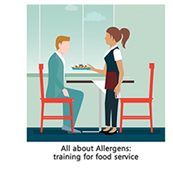 The National Allergy Strategy is currently developing All about Allergens for Other Vulnerable Populations which will provide food allergen management training for staff working in a variety of settings including residential aged care and other residential care, transitional care, respite care, rehabilitation care including mental health, disability, drug and alcohol, correctional and detention services, quarantine facilities and services, hospices and overnight, short and long stay facilities. We have established a working group comprising the required expertise to help progress development of this course.
The National Allergy Strategy is currently developing All about Allergens for Other Vulnerable Populations which will provide food allergen management training for staff working in a variety of settings including residential aged care and other residential care, transitional care, respite care, rehabilitation care including mental health, disability, drug and alcohol, correctional and detention services, quarantine facilities and services, hospices and overnight, short and long stay facilities. We have established a working group comprising the required expertise to help progress development of this course.
The All about Allergens courses continue to be well utilised, particularly the recently revised original All about Allergens course designed for staff working in both front and back of house roles in food service establishments. This course has undergone a major review with the aim to:
- Update the course content, particularly in relation to new food labelling laws.
- Shorten the time taken to do the course – now takes approximately 45 minutes to complete.
- Make the course more relevant to staff working in both front of house and back of house roles.
- Make the assessment questions easier to understand.
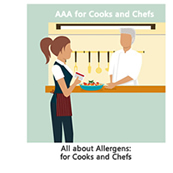 The Next Step for Cooks and Chefs course has also been updated. It was originally a follow-on course, but based on feedback from the sector, we have modified the course to be a single stand-alone course.
The Next Step for Cooks and Chefs course has also been updated. It was originally a follow-on course, but based on feedback from the sector, we have modified the course to be a single stand-alone course.
All about Allergens for Cooks and Chefs takes approximately one hour to complete.
NEW Workplace catering resources
The National Allergy Strategy has created a workplace catering checklist and poster. These resources are designed to support people with food allergies in the workplace by providing information about how to cater for people with food allergies. These resources can be downloaded from the food allergy aware or food allergy education websites and printed copies will be available soon from the Allergy & Anaphylaxis Australia shop (available free, including free postage).
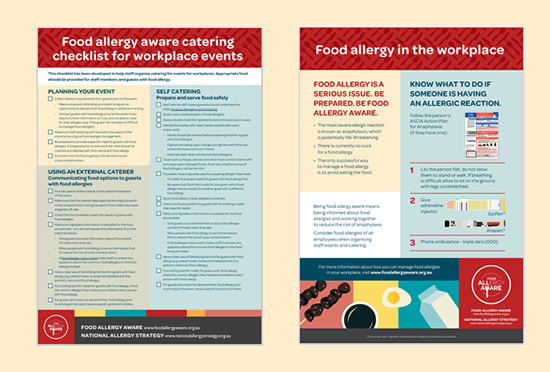
Food allergy education website
The food allergy education website, which provides top line practical information for people with food allergies and carers of people with food allergies, has been updated. The updated site design makes it easier to find the information you are looking for and ReadSpeaker has been added to the site.
Authorised Officer Resource Hub
The Authorised Officer resource hub has also been reviewed and updated. This website has been designed to make accessing food allergen management information easier to access for environmental health officers and other authorised officers.

Other news
Acute Anaphylaxis Clinical Care Standard
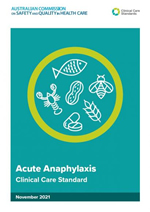 The National Allergy Strategy is proud to have supported the development of the Acute Anaphylaxis Clinical Care Standard and we congratulate the Australian Commission on Safety and Quality in Health Care for developing this important Standard in collaboration with key stakeholders.
The National Allergy Strategy is proud to have supported the development of the Acute Anaphylaxis Clinical Care Standard and we congratulate the Australian Commission on Safety and Quality in Health Care for developing this important Standard in collaboration with key stakeholders.
The Acute Anaphylaxis Clinical Care Standard is underpinned by ASCIA’s guidelines for the acute management of anaphylaxis. We believe the Acute Anaphylaxis Clinical Care Standard will help improve emergency treatment of anaphylaxis and align it with evidence-based, best practice in Australia whether the anaphylaxis is being managed in a hospital or in the community by paramedics or general practitioners.
Visit the Australian Commission on Safety and Quality in Health Care website for more information about the Acute Anaphylaxis Clinical Care Standard.
healthdirect information partner
 The National Allergy Strategy is a healthdirect Information Partner, and you will now see the acknowledgment of this on all the National Allergy Strategy websites.
The National Allergy Strategy is a healthdirect Information Partner, and you will now see the acknowledgment of this on all the National Allergy Strategy websites.

FREE posters and bookmarks
The following National Allergy Strategy resources are available free of charge (including free postage) from the Allergy & Anaphylaxis Australia online shop:
- Nip allergies in the Bub bookmarks
- Nip allergies in the Bub posters
- 250K bookmarks
- 250K posters
- All about Allergens online training bookmarks
- The Usual Suspects poster (developed with the NSW Food Authority and Allergy & Anaphylaxis Australia)
- Best practice guidelines for schools and CEC bookmarks
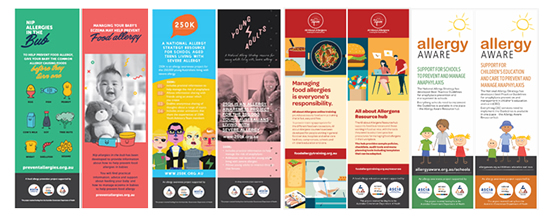

Stay informed about the National Allergy Strategy
Follow us on Facebook, LinkedIn, Instagram and Twitter to stay informed or visit the National Allergy Strategy website: nationalallergystrategy.org.au


